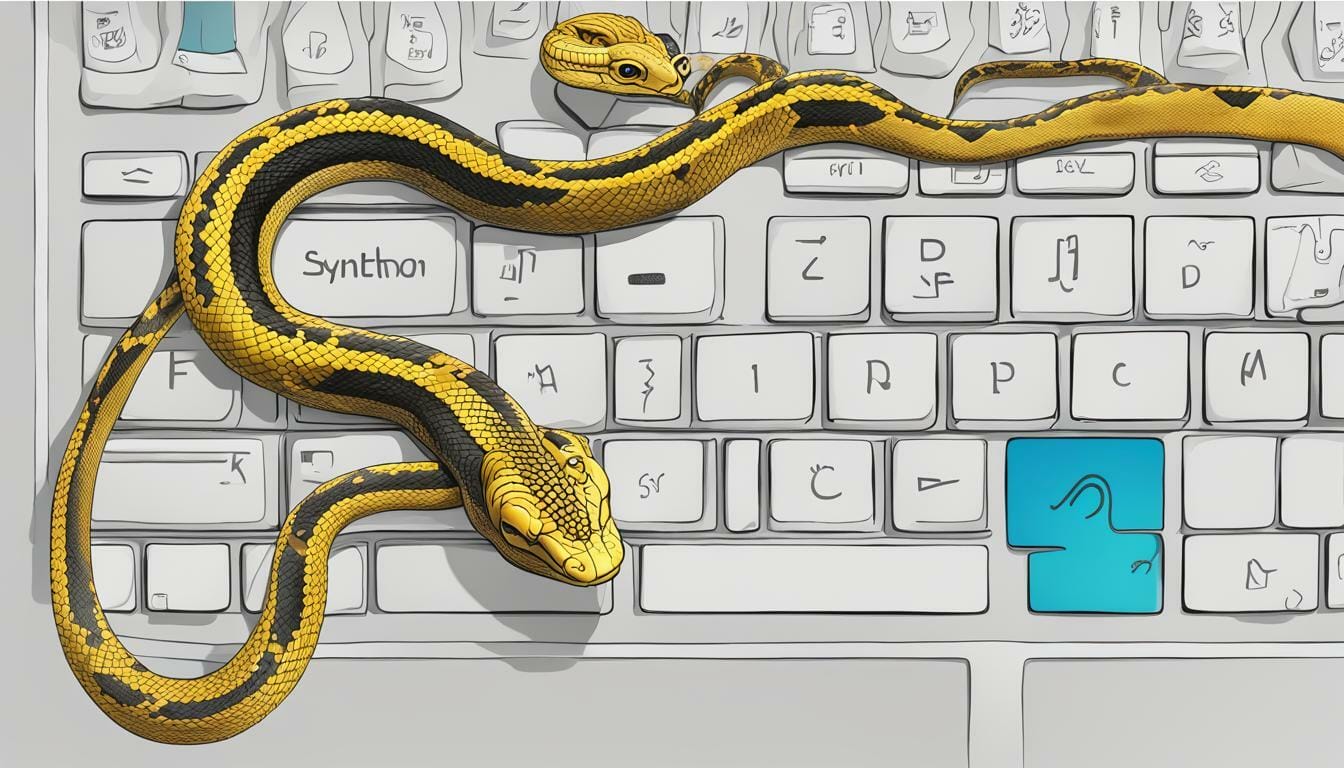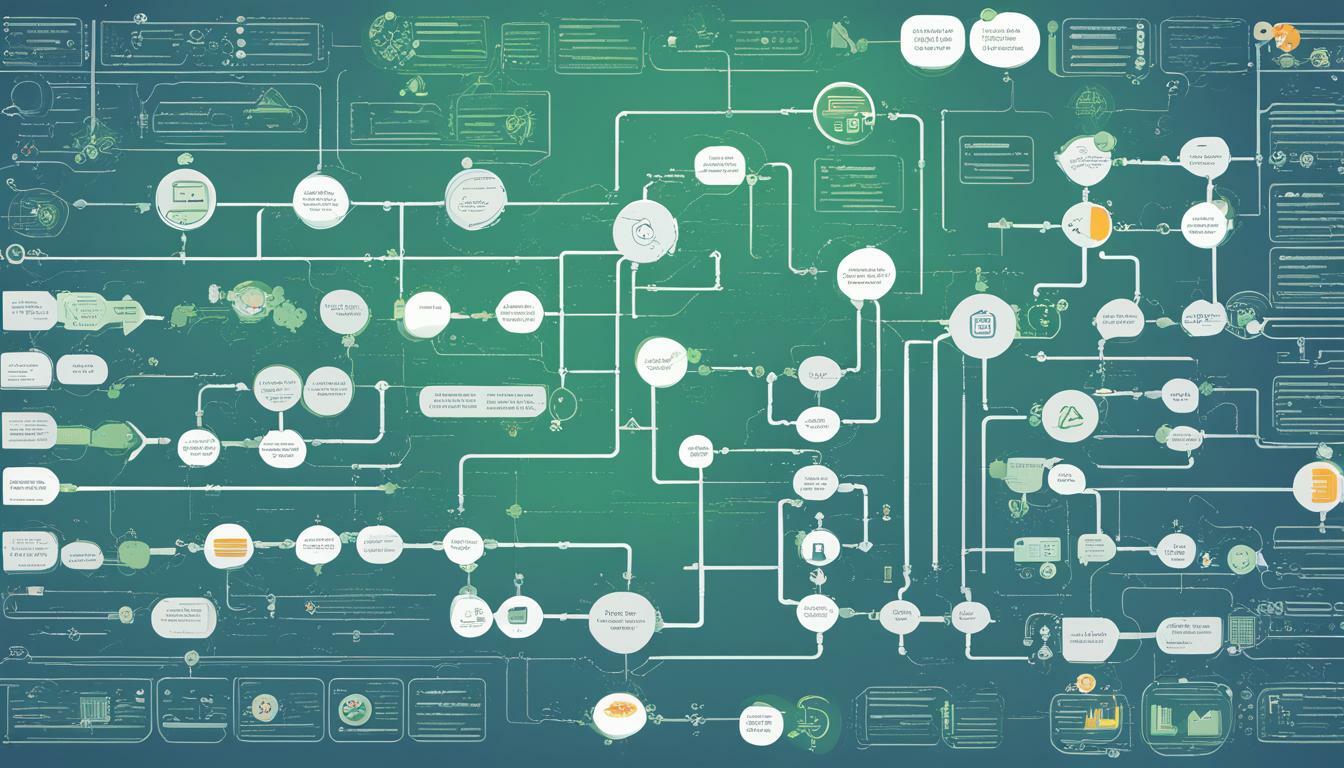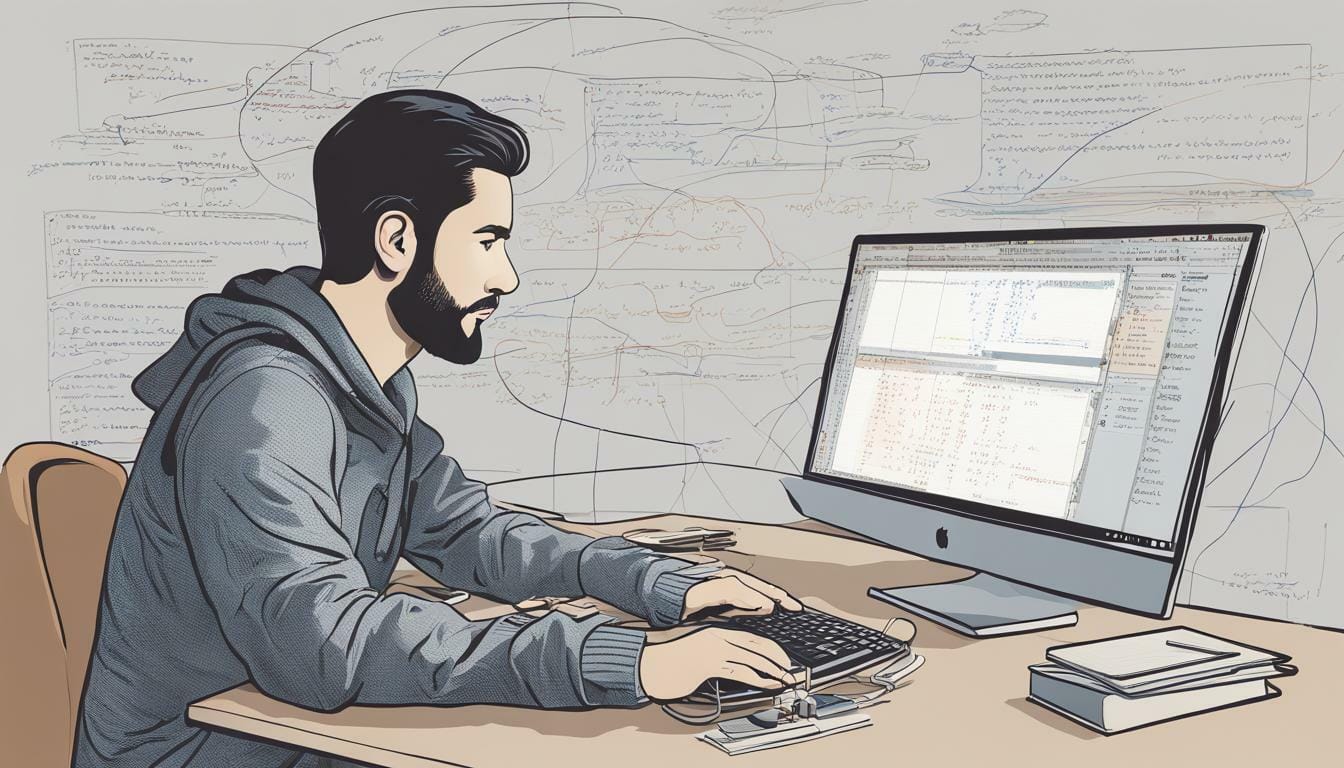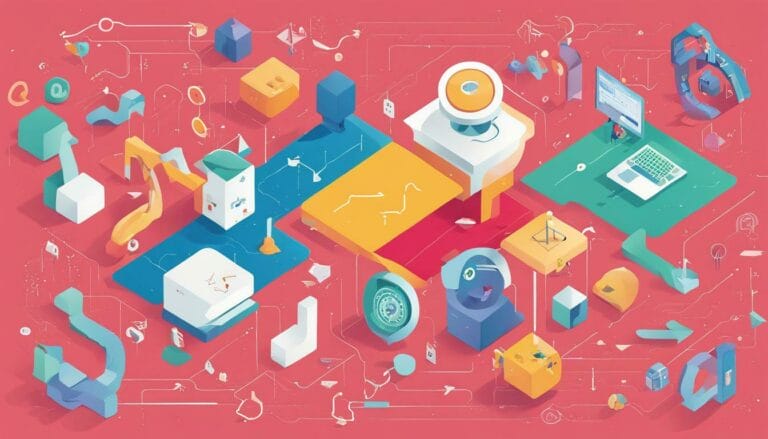Excel at Your Job Search with These Python Interview Tips

If you’re looking for a position that requires Python skills, be ready for a Python-centric coding interview. As an experienced reporter with deep knowledge of the copywriting sector, I’ve gathered some extremely helpful tips for Python interviews. These suggestions won’t just support you in your interview preparation phase, but will also make a significant difference in your job hunt.
Whether you are a beginner or an experienced programmer, these tips can help you feel more confident and prepared during the interview process. From understanding the interview process to mastering the basics of Python, these tips cover all the necessary steps to ensure your success.
Key Takeaways:
- Preparing for a Python coding interview is essential for job success.
- Python interview questions cover various topics, including coding problems, data structures, algorithms, libraries, and frameworks.
- Researching the company and role, mastering the basics of Python, and practicing coding problems are crucial steps for Python interview preparation.
- Demonstrating problem-solving skills and effective communication during the interview process can set you apart from other candidates.
Understanding the Python Interview Process
Before diving into the specifics of Python interview preparation, it’s important to have a clear understanding of the interview process as a whole. While the process may vary slightly from company to company, most Technical Interviews follow a similar structure.
| Stage | Description |
|---|---|
| Screening | This initial stage typically involves a phone screen or a coding challenge to assess your basic technical skills. |
| Technical Interview | This stage will have you sit down with one or more interviewers to work through technical questions related to Python programming. |
| Behavioral Interview | This stage focuses on your soft skills, communication abilities, and other non-technical aspects of the job. |
| Offer | If you make it through the first three stages successfully, you may receive an offer or be invited for a final round of negotiations. |
Throughout this process, you can expect to receive a mix of technical and non-technical questions. Technical questions may range from basic syntax and language rules, to more complex programming problems. Non-technical questions may include asking about your past experience and how you work in a team. It’s important to prepare for a variety of questions to ensure you are ready for whatever is thrown your way.
As you prepare for your Python technical interview, be sure to practice coding problems and review the basics of Python programming. By doing so, you will feel more confident and prepared to tackle any question that comes your way.

Research the Company and Role
In order to excel in a Python interview, it’s essential to research the company and role prior to the interview. By doing so, you’ll be able to tailor your answers to align with the company’s goals and objectives, as well as demonstrate your enthusiasm for the position.
When researching the company, be sure to look into their mission statement, values, and recent projects. This will give you insight into what the company is prioritizing and where they’re headed in the future. It’s also a good idea to research the industry as a whole, so you can speak to any trends or challenges affecting the field.
When researching the role, take a close look at the job description to identify the key responsibilities and required skills. This will help you understand what the interviewer is looking for in a candidate, and you can use this knowledge to tailor your answers to highlight your relevant experience and skills.
During the interview, demonstrate your knowledge of the company and role by asking insightful questions and referencing specific projects or initiatives. This will show the interviewer that you’ve done your homework and are genuinely interested in the position.
 Remember, research is key to a successful Python interview. Take the time to understand the company and role, and use this knowledge to showcase your skills and enthusiasm during the interview.
Remember, research is key to a successful Python interview. Take the time to understand the company and role, and use this knowledge to showcase your skills and enthusiasm during the interview.Master the Basics of Python
Before diving into more complex concepts, it’s important to have a strong foundation in the basics of Python. This includes understanding variables, data types, and control structures.
When preparing for a Python job interview, be sure to review common interview questions related to these topics, such as:
What are the different data types in Python?
How do you declare a variable in Python?
What is the difference between a list and a tuple?
Additionally, it’s beneficial to practice writing basic Python programs. This can include simple exercises such as a program to calculate the factorial of a number or a program to determine if a given number is prime.
Remember, demonstrating a strong understanding of the basics can set a strong foundation for success in the rest of the interview process.

During the interview, be sure to use proper syntax and formatting when writing code. This includes using appropriate variable names and indentations to make your code clear and easy to read for the interviewer.
By mastering the basics of Python, you will not only be better equipped to answer interview questions, but also demonstrate your competence and confidence as a Python programmer.
Practice Python Coding Problems
One of the best ways to prepare for a Python programming interview is to practice coding problems. These problems not only help you improve your coding skills but also prepare you to think critically under pressure. Here are some tips to help you get started:
- Start with simple problems: Begin with basic coding challenges before moving on to more complex ones. This will help build your confidence and improve your problem-solving skills gradually.
- Use online resources: There are many websites and online platforms that offer coding challenges specifically designed for Python. Examples include HackerRank, LeetCode, and Project Euler. These resources provide a wide range of problems to choose from, including easy, medium, and hard difficulty levels.
- Implement data structures and algorithms: Many coding problems involve implementing specific data structures or algorithms. Make sure to familiarize yourself with these concepts and practice implementing them.
By practicing coding problems, you will not only be better prepared for technical interviews but also gain valuable experience in Python programming.

“The only way to learn a new programming language is by writing programs in it.” – Dennis Ritchie
Understand Data Structures and Algorithms in Python
In Python interviews, having a solid understanding of data structures and algorithms is crucial. Interviewers often ask questions related to data structures and algorithms to gauge your problem-solving and coding abilities. Therefore, it is essential to be well-versed in the following:
Data Structures
Data structures are containers that hold data in an organized manner. Familiarize yourself with the common data structures in Python:
| Data Structure | Description |
|---|---|
| Lists | An ordered collection of elements |
| Dictionaries | A collection of key-value pairs |
| Sets | An unordered collection of unique elements |
| Tuples | An ordered, immutable collection of elements |
Algorithms
Algorithms are a set of instructions that solve a specific problem. Ensure you have a good understanding of the following algorithms:
- Sorting algorithms
- Searching algorithms
- Recursive algorithms
- Graph algorithms
By understanding data structures and algorithms, you can write efficient and optimized code, which is highly valued in Python interviews.

Brush Up on Python Libraries and Frameworks
Python is a versatile programming language that supports a wide range of libraries and frameworks, making it a popular choice in various industries. During a Python programming interview, it is essential to demonstrate your knowledge and experience with these tools.
Some of the most commonly used Python libraries include:
| Library | Purpose |
|---|---|
| Pandas | Data analysis and manipulation |
| Numpy | Numerical computing and mathematical operations |
| Scikit-learn | Machine learning algorithms and model building |
Python frameworks such as Django and Flask are also crucial for web development, and having experience with these frameworks can give you a competitive edge in the job market.
When preparing for your Python interview, research the company and role to determine which libraries and frameworks they use and tailor your interview answers accordingly. Additionally, be prepared to showcase your skills and experience with these tools by highlighting relevant projects or contributions.

Overall, demonstrating your proficiency with Python libraries and frameworks is essential to stand out in a Python programming interview and secure your dream job.
Demonstrate Problem-Solving Skills in Python
Problem-solving skills are crucial in any job interview, especially for a Python programming role. A Python developer must be able to think critically and come up with effective solutions to complex problems. Therefore, interviewers often test problem-solving skills by asking candidates to solve coding problems or puzzles.
To prepare for Python interview questions that test problem-solving skills, you should practice coding problems beforehand. There are many resources available online that offer practice problems and solutions, such as LeetCode, HackerRank, and CodeSignal. Remember to start with simpler problems and gradually move on to more complex ones.
When solving coding problems, it’s essential to approach them systematically and logically. Divide the problem into smaller, more manageable subproblems, and solve each one step by step. Also, write clean and organized code that is easy to read and understand.
During the interview, don’t be afraid to ask clarifying questions if you are unsure about the problem’s requirements or constraints. Interviewers want to see how you approach the problem and how you communicate your thought process.
Finally, be prepared to explain your solution and the reasoning behind it. Interviewers will ask follow-up questions to test your understanding of the code and how you arrived at your solution. Therefore, it’s crucial to have a clear understanding of your approach and the code you wrote.
Practicing problem-solving skills is an excellent way to prepare for Python interview questions and demonstrate your coding abilities. By following these tips and practicing regularly, you can improve your problem-solving skills and increase your chances of acing the Python programming interview.

How Can Outsourcing HR Help in the Job Search Process?
Outsourcing HR services can greatly benefit job seekers by allowing them to focus on their strengths and interests. By allocating tasks such as recruitment and hiring to external experts, job seekers can save time and effort that would otherwise be spent on non-core activities. Additionally, the cost of outsourcing hr can be a more affordable option as it eliminates the need for an in-house HR department, saving both recruitment and operational costs. This strategy enables job seekers to streamline their job search process and increase their chances of securing the perfect opportunity.
Enhance Your Communication and Soft Skills
While technical skills are crucial for excelling in Python interviews, it’s important not to overlook the significance of effective communication and soft skills. As an interviewer, I always appreciate candidates who can effectively articulate their thoughts and ideas. Here are some communication and soft skills that can impress your interviewer:
Active Listening
Active listening is a crucial communication skill that involves paying close attention to what the other person is saying and asking pertinent follow-up questions. During your Python interview, make sure to actively listen to the interviewer’s questions and respond thoughtfully. This demonstrates that you are engaged with the conversation and value the interviewer’s time.
Empathy
Empathy is the ability to understand and share the feelings of another person. In a Python interview, demonstrating empathy can show the interviewer that you care about the success of the company and its employees. For example, if the interviewer mentions a particular challenge the company is facing, you could respond with empathy towards their situation.
Teamwork
Python developers often work in teams, so demonstrating teamwork skills during the interview process is essential. Highlight any experience you have working with others in a collaborative setting, and provide examples of how you have contributed to the success of a team project.
Positive Attitude
A positive attitude can go a long way in a Python interview. Show enthusiasm for the position and the company, and be optimistic about your ability to succeed in the role. This can be conveyed through your tone of voice, body language, and overall demeanor.
Confidence
Confidence is key in any interview, and a Python interview is no exception. Be confident in your technical abilities and your potential to excel in the role. However, it’s important to strike a balance between confidence and arrogance. Avoid overconfidence or dismissing the importance of the interviewer’s questions.
Summary
Effective communication and soft skills can set you apart from other candidates in a Python interview. Active listening, empathy, teamwork, a positive attitude, and confidence are all valuable traits to demonstrate during the interview process. Remember to strike a balance between technical skills and soft skills to impress your interviewer.

Conclusion
As a Python job seeker, it’s crucial to prepare yourself for the interview process. By following these Python interview tips and techniques, you can enhance your chances of impressing the interviewer and landing your dream job.
First and foremost, understand the Python interview process and the types of questions you can expect. This knowledge will help you prepare for the interview and approach it with confidence. Additionally, research the company and the role to tailor your answers to the specific job requirements.
To excel in the interview, master the basics of Python, practice coding problems, and understand data structures and algorithms. It’s also important to brush up on popular Python libraries and frameworks and showcase your problem-solving skills.
Finally, don’t underestimate the importance of communication and soft skills. These skills are just as crucial as technical skills in many job roles, and it’s essential to demonstrate your interpersonal abilities during the interview process.
With these Python interview tips and techniques in mind, you can approach your next interview with confidence and demonstrate your skills and abilities as a Python developer.
Remember:
Preparation is key to success in a Python interview. Use this guide as your Python interview preparation guide and take the time to research the company, review Python basics, practice coding problems, and brush up on Python libraries and frameworks. Don’t forget to showcase your communication and soft skills as well to prove your suitability for the role.
By following these Python interview tips, you’ll be well-prepared to excel in your next Python coding interview and land your dream job.
FAQ
Q: What are Python interview tips?
A: Python interview tips are strategies and suggestions aimed at helping individuals prepare for and excel in their Python coding interviews. These tips cover various aspects of the interview process, including technical knowledge, problem-solving skills, and communication abilities.
Q: How can Python interview tips help me?
A: Python interview tips can provide guidance on how to effectively navigate the interview process, enhance your technical skills, and present yourself as a strong candidate. Following these tips can increase your confidence and improve your chances of success in landing a Python-related job.
Q: Are Python interview tips only for beginners?
A: No, Python interview tips are beneficial for individuals of all levels of experience, from beginners to advanced programmers. These tips can help beginners gain a solid foundation in Python coding and provide insights for experienced professionals to further refine their skills.
Q: How should I prepare for a Python interview?
A: Preparation for a Python interview involves various steps, including studying key concepts, practicing coding problems, familiarizing yourself with common interview questions, and researching the company and role. It is essential to be well-prepared and confident in your abilities.
Q: Where can I find resources for practicing Python coding problems?
A: There are several online platforms and websites that offer coding practice specifically for Python. Examples include LeetCode, HackerRank, and CodeSignal. Utilizing these resources can help you improve your coding skills and problem-solving abilities.
Q: How important are communication skills in a Python interview?
A: Communication skills are crucial in a Python interview as they allow you to effectively convey your thoughts, explain your solutions, and demonstrate your understanding of technical concepts. Strong communication skills can differentiate you as a candidate and leave a positive impression on the interviewer.
Q: What are some popular Python libraries and frameworks?
A: Popular Python libraries and frameworks include Django, Flask, NumPy, pandas, and TensorFlow, among others. These libraries and frameworks are widely used in various industries and showcasing familiarity with them can be beneficial during a Python interview.
Q: How can I showcase my problem-solving skills in a Python interview?
A: To demonstrate your problem-solving skills, you can discuss your approach to solving complex programming problems, showcase your ability to break down problems into smaller tasks, and explain the reasoning behind your solutions. Providing clear and concise explanations will highlight your problem-solving abilities.
Q: Can soft skills impact my performance in a Python interview?
A: Yes, soft skills such as effective communication, teamwork, and adaptability can greatly impact your performance in a Python interview. These skills demonstrate your ability to work well with others, handle challenges, and contribute positively to the company culture.






